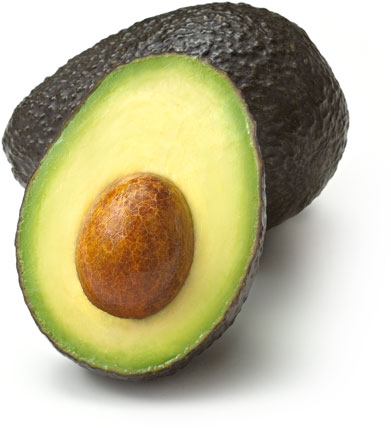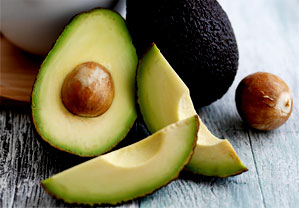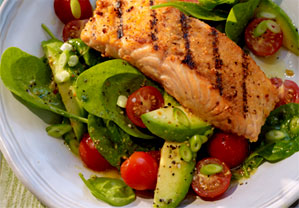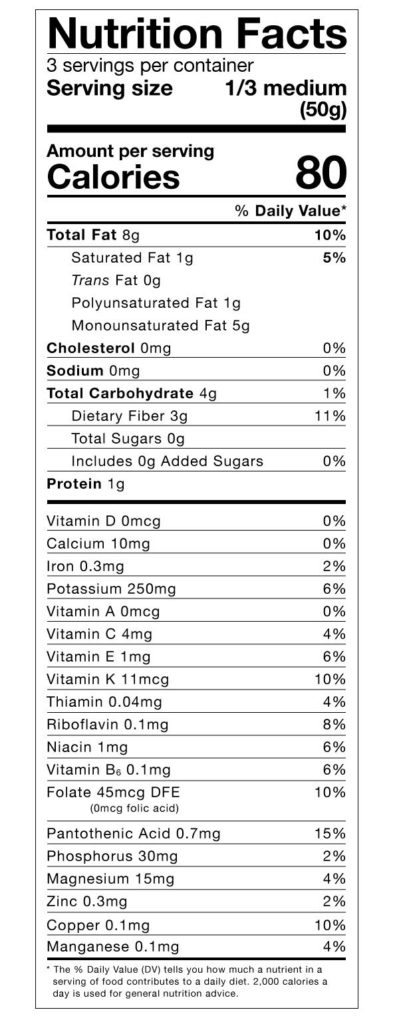A nutritious superfood, Avocados from Peru are great in summer salads, burgers on the grill or all by themselves.
This naturally nutrient dense fruit provides nearly 20 vitamins, minerals and other nutrients with relatively few calories. They are sodium and cholesterol free and they contain the same good fats as nuts and olive oil. In fact, Avocados from Peru are even a great first food for babies! And since creamy, delicious avocados are so satisfying to eat, they’ll fill you up but they won’t slow you down.
Did you know that Avocados are virtually the only fruit that contain monounsaturated fats which can contribute to a heart healthy diet? In fact, Avocados fit into healthy eating patterns included in the Dietary Guidelines for Americans, 2015
An ounce of Avocado contains 81 mcg of lutein; some research suggests lutein can help protect against cataracts and macular degeneration
Avocados contain “good” fats that are associated with lower bad cholesterol levels when used in place of other fats
Amazing Flavor, Surprising Nutrition.
Avocados contain “good fats” (mono and polyunsaturated fats), the same as nuts and olive oil. They have nearly 20 vitamins & minerals, including 250mg potassium and 3g dietary fiber. Avocados are naturally sodium and cholesterol free and are a delicious way to help meet daily recommendations set forth in the 2020 Dietary Guidelines for Americans.1
The 2022 Dietary Guidelines for Americans recommends making small dietary shifts such as replacing foods higher in saturated fats with foods containing good fats, like avocados. Avocados are virtually the only fruit with good fats and are a delicious way to help people meet the Dietary Guidelines for Americans recommendation to shift from eating saturated fats to good fats.
The USDA Dietary Guidelines also encourages Americans to increase their intake of dietary fiber and states that dietary fiber that occurs naturally in foods may help reduce the risk of cardiovascular disease, obesity, and type 2 diabetes, as well as help provide a feeling of fullness and promote healthy laxation. One-third of a medium avocado (50 grams) contains 11% of the Daily Value for dietary fiber, making Avocados a great way to reach the Dietary Guidelines daily fiber recommendation.
Nutrient Dense
Nutrient-dense foods provide substantial amounts of vitamins, minerals and other nutrients with relatively few calories. A 1 oz. serving of Avocado contains 50 calories and contributes nearly 20 vitamins and minerals, making it a nutrient-dense food.
Sodium & Cholestral Free
The USDA recommends a diet low in sodium and cholesterol and Avocados are naturally sodium and cholesterol-free.
Contains ‘Good Fats’
Over 75% of the fats in an Avocado are mono and polyunsaturated fats, also known as the “good fats” and can satisfy your hunger when replacing other fats in a calorie-restricted diet.
Diet Approved? YES!
Avocados fit into the Paleo and Mediterranean diets as well as the DASH eating plan and dietary programs from some of the world’s leading nutrition organizations such as the USDA’s Dietary Guidelines for Americans.
Beneficial for baby
Avocados are nutrient dense, easy to digest and have a creamy consistency that make them a great first food for babies.
Great Taste. More Filling
Adding avocados to your healthy diet can make it even more satisfying.
Adding avocados to your diet is also the perfect way to boost your daily fruit intake. Avocados are a “nutrient-dense” fruit which means they contribute nearly 20 vitamins, minerals and phytonutrients to the diet, including 8% of the Daily Value (DV) for dietary fiber and 4% of the DV for potassium, per one ounce serving. Although Phytonutrients are not essential, studies suggest they may promote human health.
Avocados contain 6% of the DV for folate, 4% of the DV for potassium and vitamins E and C; and 2% of the DV for iron.
A 1-oz. serving of avocado contains 25 milligrams of beta-sitosterol; research suggests beta-sitosterol may help maintain healthy cholesterol levels. A 1-oz. serving of avocado also contains 81 micrograms of the carotenoids lutein + zeaxanthin; research suggests lutein + zeaxanthinmay help maintain eye health as we age.
Download the complete Hass Avocado Board Nutrition Points (PDF)
“Avocados can act as a nutrient booster by enabling the body to absorb more fat-soluble nutrients from foods eaten with them”
Good Fats from a Superfood
There are nutritionally good fats in avocados, with over 75% of the fat as monounsaturated (MUFA) and polyunsaturated (PUFA) fats.
Eating these beneficial unsaturated fats in place of saturated fats is associated with improved blood cholesterol levels, and eating avocados in place of foods containing saturated fats is a simple and tasty way to help limit the amount of saturated fat in your diet.
The Dietary Guidelines for Americans, 2015 states that replacing some saturated fatty acids with unsaturated fatty acids lowers both total and low-density lipoprotein (LDL) blood cholesterol levels.
And studies show replacing saturated fat with unsaturated fat, while staying within calorie needs, is more effective in reducing the risk of heart disease than simply lowering total fat intake.
Avocados & Eye Health
An ounce of avocado contains 81 micrograms of lutein. Lutein is a natural antioxidant that may help maintain eye health as we get older and research suggests that consuming 10 mg/day may help maintain healthy eyesight as we age.
By adding avocado to foods like salads, salsa, soups or sandwiches you can get more of the phytonutrient lutein in your diet.
A Healthy Diet Choice
When eaten in place of other fat sources, nutrient-dense Avocados can be a delicious addition to many healthy diets and eating plans.
Avocados can be eaten alone or used in a variety of delicious recipes – from soups to salads to smoothies – all of which can fit into a sensible eating plan and many popular diets like the Paleo and Mediterranean diets and many more.
Baby Food Never Tasted So Good!
As any new mom will tell you, to become one of baby’s first foods, first baby has to like it. And the mild flavor and creamy consistency of avocados from Peru nearly always ace the taste test.
And with plenty of important vitamins and minerals, no sodium or cholesterol and easily digestible, avocados are a great choice for baby’s first fruit.
But you don’t have to wait for baby to come to enjoy avocados from Peru. Avocados are a delicious way for Mom to get the nutrients she needs when pregnant or breastfeeding.
Avocados & Heart Health
The American Heart Association recommends a diet that is low in saturated fat (less than 7% of energy), trans fats (less than 1% of energy), cholesterol (less than 300 mg per day) and sodium. And that means avocados, with zero cholesterol or sodium, 0.5g saturated fats and 3.5g mono and polyunsaturated fats.
According to the American Heart Association, good fats are beneficial when consumed in moderation and used to replace saturated or trans fats. Avocados have “good fats” providing 3 grams of monounsaturated fat and 0.5 grams of polyunsaturated fat per 1oz. serving.
Get The Skinny On Avocados & Belly Fat
Mayo Clinic (Mayo Foundation for Medical Education and Research) suggests eating a healthy diet as a way to help fight belly fat, including emphasizing plant-based foods and replacing saturated fats with unsaturated fats while keeping portion sizes in check.
Avocados are a nutrient-dense fruit and have good fats—both monounsaturated and polyunsaturated fats. One-fifth of a medium avocado (1 oz) has 50 calories and nearly 20 vitamins and minerals.
Dietary Guidelines for Americans, 2015-2020.
Available at: http://www.health.gov/dietaryguidelines/2015/guidelines/.
They agree on the power of avocados
You probably already know that Avocados from Peru can be an important part of your healthy diet. But what do others have to say about them? We’re glad you asked.
U.S. Congress
In the Hass Avocado Promotion, Research, and Information Act of 2000, Congress declared that Hass Avocados are an integral food source in the United States that are a valuable and healthy part of the human diet and are enjoyed by millions of persons every year for a multitude of everyday and special occasions.
Learn more at Ams.usda.gov.
American Heart Association
According to the American Heart Association, good fats (such as those found in avocados) are beneficial when consumed in moderation and used to replace saturated or trans fats.
For more facts about heart health visit Heart.org
Good Fats from a Superfood
There are nutritionally good fats in avocados, with over 75% of the fat as monounsaturated (MUFA) and polyunsaturated (PUFA) fats.
Eating these beneficial unsaturated fats in place of saturated fats is associated with improved blood cholesterol levels, and eating avocados in place of foods containing saturated fats is a simple and tasty way to help limit the amount of saturated fat in your diet.
The Dietary Guidelines for Americans, 2015 states that replacing some saturated fatty acids with unsaturated fatty acids lowers both total and low-density lipoprotein (LDL) blood cholesterol levels.
And studies show replacing saturated fat with unsaturated fat, while staying within calorie needs, is more effective in reducing the risk of heart disease than simply lowering total fat intake.
The Paleo diet
The Paleolithic diet, Paleo diet, caveman diet, or stone-age diet is a modern fad diet consisting of foods thought by its proponents to mirror those eaten by humans during the Paleolithic era.
The diet avoids processed food and typically includes vegetables, fruits, nuts, roots, and meat and excludes dairy products, grains, sugar, legumes, processed oils, salt, alcohol, and coffee. Historians can trace the ideas behind the diet to “primitive” diets advocated in 19th century.
The Mediterranean Diet
The Mediterranean Diet is promoted as a lifestyle based on the foods, drinks and activities of those countries surrounding the Mediterranean Sea. This includes a diet rich in fruits and vegetables, grains, fish, poultry and lean red meat in moderation. The unsaturated fats provided by avocados make them a natural for this type of eating. Avocados are included in the Mediterranean Food Alliance Med Mark program.
Learn more at oldwayspt.org
The Dash Diet
The DASH diet has been named Best Healthy Eating diet and Best Overall diet by U.S. News & World Report. A healthy lifestyle program that emphasizes consumption of fruits, vegetables, fat-free or low-fat dairy products, whole grains, fish, poultry, seeds, and nuts. The DASH diet helps to lower blood pressure. Avocados, a fruit containing significant mono- and poly-unsaturated fats, are clearly a good fit for this popular and effective plan.
Learn more at The National Heart, Lung & Blood Institute
Nutrition by the Numbers
Avocados from Peru are loaded with great nutrients. They’re a fresh and natural fruit, of course. They contain nearly 20 important vitamins and minerals, but zero sodium or cholesterol. And they provide mono-unsaturated and polyunsaturated fats. Replacing some saturated fats with unsaturated fats can help to lower cholesterol levels.
In fact, avocados are often referred to as nutrient-dense foods, which means they contain substantial amounts of nutrients as compared to their number of calories.
So while you might eat avocados for their great flavor, you’re also getting 150 mg of Potassium, a mineral which can help offset the negative effects of sodium on blood pressure. And 4 percent of the daily value of Vitamin E which helps protect the body against free radicals. Avocados also contain 4 percent of the daily value of Vitamin B6 which helps your body produce the antibodies that fight disease. And you’re not getting things you don’t need, like added sodium or cholesterol. So enjoy your avocado. Your body will appreciate it as much as your taste buds.






